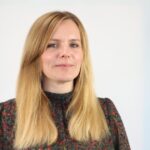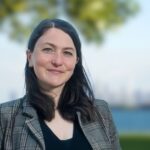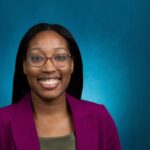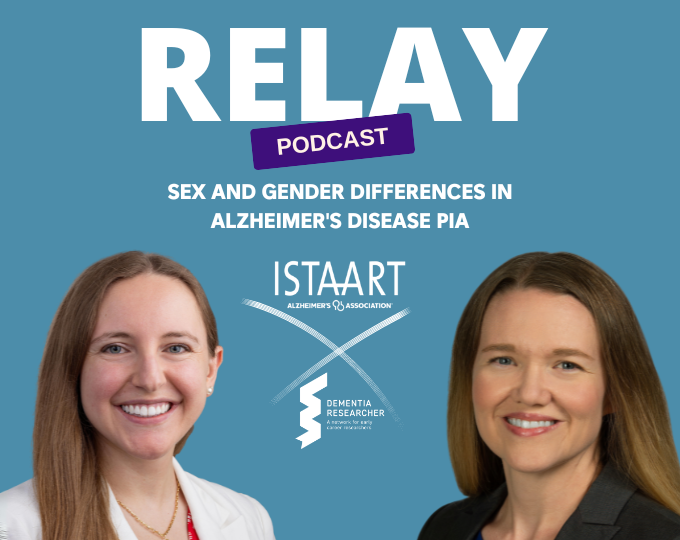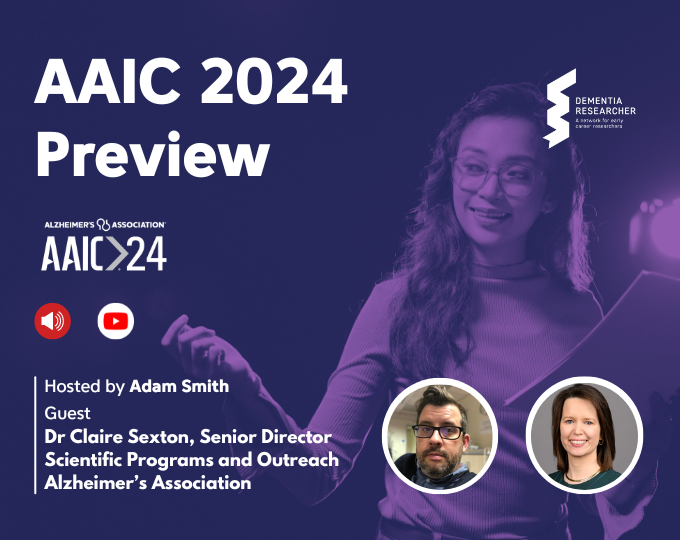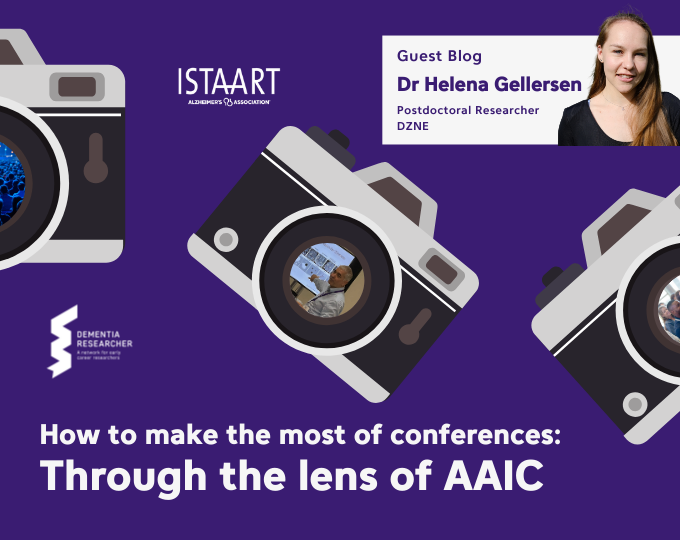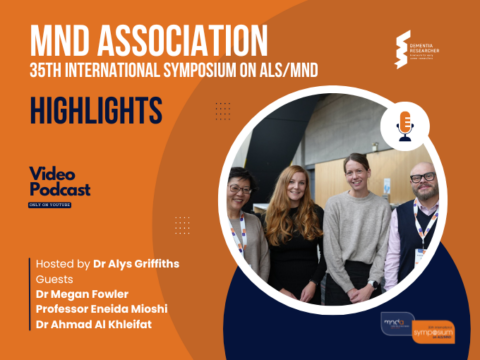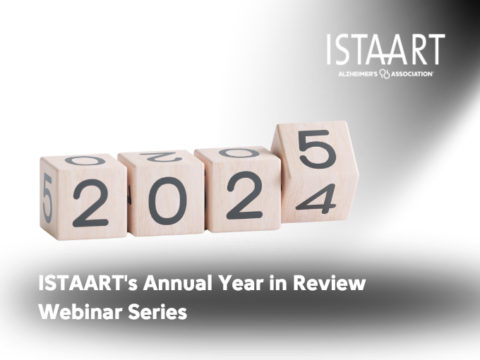In this podcast we share a few selected highlights from the first two days of the Alzheimer’s Association International Conference (AAIC) taking place in Philadelphia and Online, 28th July to 1st August.
Dr Francesca Farina hosts the show with special guests:
- Dr Annalise Rahman-Filipiak, Assistant Professor, Clinical Neuropsychologist at University of Michigan
- Dr Tamlyn Watermeyer, NIHR / Alzheimer’s Society Dem Comm Fellow at Northumbria University and University of Edinburgh working on cognition and brain health.
- Dr Merci Best, Research Fellow at the University of Michigan's Paulson Lab, studying the molecular mechanisms of tau-mediated neurodegeneration
The AAIC brings together distinguished basic scientists, clinical researchers, early career investigators, clinicians and the care research community at the largest and most influential international conference on dementia science. They share theories and breakthroughs while exploring opportunities to accelerate work and elevate careers.
Main plenary talks from the day included Edward B. Lee presenting 'Neuropathology In A Multidisciplinary Age', Timothy Miller on 'Antisense Oligonucleotide Therapeutics For Neurodegenerative Diseases', Henne Holstege delivering a talk titled 'From Longevity To Vulnerability: Genomic Pathways Underlying Cognitive Health In Centenarians And Neurodegenerative Disease'.
Dr Francesca Farina:
Hi, everyone. This week, researchers from across the world have come together for AAIC, the Alzheimer's Association International Conference, and we are here to give you some of the highlights. My name is Dr. Francesca Farina, and I work at the University of Chicago, and I'm joined by three amazing guests today. I'm so excited. We are joined by Dr. Annalise Rahman-Filipiak from the University of Michigan. We are joined by Dr. Merci Best, also from the University of Michigan, and Dr. Tamlyn Watermeyer from Northumbria University and the University of Edinburgh. So let's begin with each of you just giving a couple minutes about who you are, what your work is, and we'll start with that. Let's start with Merci.
Dr Merci Best:
All right. My name is Merci Best, as you just mentioned. I study tau, that protein that everybody's been talking about that abnormally accumulates in the brain, and I really explore the mechanisms of how brain cells die, and I'm really focusing on Alzheimer's disease, progressive supranuclear palsy, and frontal temporal dementia.
Dr Annalise Rahman-Filipiak:
Sure. I'm Annalise Rahman-Filipiak. I am a neuropsychologist and assistant professor at the University of Michigan. As you said, go blue. I also have the great joy of being our co-lead for our outreach recruitment and engagement core for the Michigan Alzheimer's Disease Research Centre, so my interests are really in aspects of recruitment science, a topic we're talking about a lot at AIC. How do we diversify our samples? But my own lab focuses on how we go about communicating research-based results, things like amyloid and tau PET to diverse audiences, so folks who are new to research, folks who are coming from underrepresented communities, that sort of thing.
Dr Francesca Farina:
Brilliant. And Tam, tell us about yourself.
Dr Tamlyn Watermeyer:
Great. I'm Tam. I'm also from a neuropsychology research background, and I've worked across various neurogenerative conditions where there is a dementia component. More recently, my interests have turned to down syndrome and learning disabilities, and I'm particularly interested in adapting and creating novel cognitive measures for the assessment in marginalised groups, including global majorities and some interventional work as well.
Dr Francesca Farina:
Brilliant. So there's so much in everything that you just said. I mean, already, so lots to get into. We are on Tuesday today. We're day two of the conference, but the pre-conferences have been going for days and days, so before we get into the highlights of yesterday and today, the main conference, is there anything from the pre-conference that any of you wanted to highlight?
Dr Merci Best:
Yeah. I would say, to an Annalise's point, I attended the pre-conference that was run by the National Institutes of Ageing, and actually, the theme was examining diversity in recruitment and retention of Alzheimer's and related dementias. I feel like it was so powerful, because alongside the formal talks, there was an interactive component where we were able to engage with the speakers and learn how they were so successful in making sure their study was representative of their population. Some of the key things they highlighted, you would think about normally, but it's just, one, being present in the community, having that face to the name, forming those meaningful relationships, and then, two, incentives. Going in and bringing something to the community that they can really benefit from, and then that transparency, once you get the results as you're getting the results, make sure it's communicated to the populations. Who are you trying to serve?
Dr Francesca Farina:
Yeah, absolutely. That kind of accountability that the science has to-
Dr Merci Best:
Full circle.
Dr Francesca Farina:
Yeah, totally. Totally.
Dr Tamlyn Watermeyer:
Something that stuck up for me with one of the PIAs was a sex and gender PIA, where there was a debate between Dr. Chi Udeh-Momoh and Dr. Jason Flat. It was a sort of debate about the social construct of gender and how this might be a protective factor in terms of resilience with Dr. Chi Udeh-Momoh arguing that point or a risk factor with Dr. Flat, arguing that point. It was interesting, brought in some personal accounts, but also the evidence in relation to the literature, and there was a little bit of karaoke afterwards as well-
Dr Francesca Farina:
Oh, wow.
Dr Tamlyn Watermeyer:
... Which you don't get quite often, so definitely watch it on demand if it was recorded, actually.
Dr Francesca Farina:
Yeah, yeah.
Dr Annalise Rahman-Filipiak:
I think so.
Dr Francesca Farina:
So this was part of PIA day.
Dr Tamlyn Watermeyer:
Yes.
Dr Francesca Farina:
And there's how many PIAs now? There's a lot of them at any stage.
Dr Tamlyn Watermeyer:
Yeah, yeah.
Dr Annalise Rahman-Filipiak:
I got a chance to take part in the partnering with research participants PIA, which is a really excellent one, and very on theme with some of the things that you've discussed. What I found really powerful about it is that they had a fantastic kind of immersive activity for all the researchers, where they essentially gave out consent forms that were in kind of shields to make them difficult to read. They also gave us earbuds and things, so that was a bit harder to hear. And they were just talking about how a participant might navigate an informed consent process for a really complex study when they weren't able to really engage fully in that process, and how we might overcome it as researchers. I think that kind of activity is always really humbling and grounding for us and a great way to kick off a conference like this, where sometimes we're thinking about that high level science and not necessarily the patient or participant experience. Yeah, really powerful.
Dr Francesca Farina:
Totally. I just joined that PIA on the committee this year, so I'm really excited to learn more about the activities they're doing and put the patients more in the centre of the conference, and I know that they're also running a new event, a public facing event this year, as part of the conference on Thursday, which is the first time that they're doing this.
Dr Annalise Rahman-Filipiak:
Yeah. It's the AAIC for all event?
Dr Francesca Farina:
Yeah.
Dr Annalise Rahman-Filipiak:
That one?
Dr Francesca Farina:
Mm-hmm.
Dr Annalise Rahman-Filipiak:
Yeah. It's just really powerful, so they're essentially, it's translating some of the, again, high level findings from AAIC so that they are in lay language understandable to a community, really engaging community members, inviting them to come here to Philly, but also streaming it. And so, I know at our centre, we've talked about having watch parties, where we invite our community advisory boards-
Dr Francesca Farina:
Nice.
Dr Annalise Rahman-Filipiak:
... Or participants, and then have a panel to help discuss afterwards. I mean, that's in itself a really great commitment to making this kind of theoretical idea of inviting participants to the table much more real, so I love that.
Dr Francesca Farina:
Yeah, amazing. So let's get into the actual conference. We should do that. So it's been two days, and the format of this is we're just going to go around and have a chat about what stood out to us and mentioned a couple of the sessions that have happened so far, and then we'll get into maybe what you're looking forward to for the rest of the week, and if you have any upcoming presentations, or if you already presented, you can tell us a little bit about that too. So what has stood out for you? I mean, there's been so much, right? They're long days, but full of information. Anyone want to jump in?
Dr Tamlyn Watermeyer:
I started off with the lightning rounds. They start at 8:00 AM, and I was committed on a Monday. I'm always committed. I forget the exact lightning round presentation, but it was by Dr. [inaudible 00:07:17] Saunders, who works part in academia and part in industry, and her team conducted a survey between the US and the UK on priorities for brain health, and applied natural language processing to the free text data, and what was really interesting is that there were different priorities between the two groups. Then, also, the American sample had more variability and came up with more ideas, so I don't know what that says about the British, but I just thought this was really interesting, and I wonder if that were applied in low to middle income countries or non-Western countries, if we would find something even more interesting and different priorities, so it just made me think about some of the research that I'm doing in Africa and wondering if we could do something similar as well, build research from those priorities as opposed to come and decide what priorities we should be implementing.
Dr Francesca Farina:
Yeah, absolutely. I think there was a session earlier today as well, essentially stating that point, that don't go in with your research plan fixed, and just about meeting people where they're at and being open to changing your whole approach if that's what's necessary, and if that's what your community is feeding back to you. It's that sense of not just asking people, "How can we get you interested in this?" So just tell us what we need to do, and we'll do it, rather than trying to guess work or sitting in a room with just the academic group, trying to figure it out without asking anybody.
Dr Merci Best:
Yeah. One of the terms that I heard was participant led research, and really allowing them that seat at the table. For me, I was going to highlight the feature research sessions. So I was able to attend one Sunday, and it was all about one of the new tau biomarkers. My graduate advisor, Dr. George Bloom, was actually one of the panellists, and he was just highlighting some of the work that has been done to validate and verify that a phospho-tau T217 is in fact a biomarker that we can start to integrate as a way to just diagnose early. What they're seeing is that there is increased levels of this phosphorylation event about 20 years before someone presents any cognitive decline, so now we're at a stage where we do have hopeful ways to do that early diagnosis, and hopefully next year we'll be talking about early interventions of what we can start treating people with once we confirm that they're showing these different biomarker differences.
Dr Annalise Rahman-Filipiak:
That's awesome. I had a chance to attend a featured research symposium yesterday on sort of digital neuropsych testing, digital biomarkers, that sort of thing. I was very excited, because my current postdoc had a chance to present some of his own work there, but what I thought was really powerful about that session was hopefully Tamlyn will agree with me here, but as neuropsychologists, occasionally, I think we can get quite stuck in our ways. We sometimes still use tests that have been around for a long time for good reason.
Dr Francesca Farina:
[inaudible 00:10:11] see by any chance?Dr Annalise Rahman-Filipiak:
No names, no names. But I do think it was really powerful to see how technology is being leveraged to make assessment kind of more nimble, more accessible. So there were a couple of talks in there using EMA, so Ecological Momentary Assessment to assess things like subjective memory function, but also to measure different aspects of cognition, and there was a really powerful discussion afterwards about how we can gather process scores from even traditional neuropsych tests with these new technologies, and that these process scores could potentially be just more powerful, more sensitive to early and subtle changes that we see in early stages of the disease. So I thought it was a really nice representation of kind a new era of neuropsychology.
Dr Tamlyn Watermeyer:
Since that, I've been having conversations with other neuro-psychologists, and sort of also talking about how we have these stereotypes of the digital aspect of these applications of old adults don't use them, don't want to use them, or don't know how to use them, or people with learning disabilities. It's completely, actually, in our own line of work, we find that that's actually completely redundant. They're so invested. Of course, there's issues with digital poverty, but I think those stereotypes of digital not being acceptable or feasible in these groups is actually starting to slowly-
Dr Francesca Farina:
Diminish.
Dr Tamlyn Watermeyer:
Diminish, yeah. But I also went along to the multidimensional approach, which I always like to do, because that gives me hope that I'm doing something right as I age, and something that really stood out for me, I thought there was a fantastically well-designed study by, and forgive me if I misspell his name, but Nárlon Boa Sorte Silva.
Dr Francesca Farina:
Yes.
Dr Tamlyn Watermeyer:
He ran this really interesting strength training RCT with also an active control condition. Always like to see an active control condition, and found that this led to reductions in white matter pathology in both the temporal and parietal lobes in people with vascular cognitive impairments, and I think that's really important because we typically want to see this as a preventative aspect in healthy people, but they were actually taking people already with cognitive impairment, and the effects were more relevant in females, so I also like to see researchers who look at those sex differences; not just at, say, baseline, but also looking for differences in interventional effects as well, so I thought it was a really, really standout project, for me at least, that day.
Dr Francesca Farina:
Yeah, absolutely. I totally agree with we need the multimodal approach, so as exciting as all the diagnostics are, it's always nice to see the range, and I've heard the word holistic a lot, and I don't remember hearing that so much at AAIC before. So I think the space really is shifting to that understanding of, it's not going to be a one size fits all, and people will likely need multiple approaches.
Dr Tamlyn Watermeyer:
I think in the lay community, when things come out about particular, like a tea or a specific diet, people treat it like it's a magic bullet, and I just don't think that's the case. I think it's all the different behaviours and things that you're doing together, which ultimately will preserve your brain health for as long as possible, although I still drink green tea every day, just in case.
Dr Francesca Farina:
That reminds me of the plenary, the last one that we just had, which was about people who live healthy for a really long time, and what are the factors that feed into that, and what can we learn from that? So looking at people who are living, I think the oldest participant mentioned, she lived to 115.
Dr Tamlyn Watermeyer:
Wow.
Dr Francesca Farina:
And it was amazing, and just really trying to get that cohort and try to better understand what the factors lead into. Then, there were kind of issues around brain donation, and that brings up a whole other side of the conversation of, are people willing to do that, and if they're not, why not? And some of those reasons are our fault as a scientific community, why people don't want to, and so that side of things, I think, also has been really fascinating to see or why somebody may not want to get a blood biomarker or CSF.
Dr Tamlyn Watermeyer:
You raise a really important point, so working with alone disabilities communities, I know everyone's making so much fuss about blood biomarkers, and that's fantastic, but when I'm talking to them, a lot of them don't want to donate blood. They don't want to go sit in an imaging machine, they don't want to do a lumbar puncture, they don't want to give blood. I think we also really, and I have seen a lot more work here on even more noninvasive-
Dr Francesca Farina:
Like, saliva.
Dr Tamlyn Watermeyer:
Like, saliva, hair, urine, and that's really nice to see as well. I think those, obviously, still need to go through much more validation, but it's promising that we at least are designing things that can be flexible to individuals so that everyone can take part.
Dr Francesca Farina:
For sure.
Dr Merci Best:
I did want to highlight the other plenary I went to with Dr. Timothy Miller. So for me, as a tau person, it was really exciting to see the promise of some tau lowering therapeutics and how, paired with some of the beta amyloid medications that are approved, it's showing maybe that reduction of tau could also be something that we could use in parallel to really see those changes. Since there is so much complexity, as you were alluding to with the disease, we can't just have that one target approach, so he did present some evidence of the success with that.
Then, I also liked how he looped back in another disease, so as we're just focusing on Alzheimer's, we're expanding to other related dementias, he did highlight some of the effective work with amyotrophic lateral sclerosis and how they have a success story, where they found this lowering drug in the lab, and then went all the way through phase three clinical trials, and it's now FDA approved since, he said April of 2023, so that was really exciting and promising of how we're having these roadmaps of success to keep us motivated to keep that translation from the lab to bedside.
Dr Francesca Farina:
Yeah. I think that's such a great point. What can we learn from other communities, other conditions? I've heard ALS, obviously. We talk as well a lot about what we've learned from the HIV community and the cancer, in terms of our messaging as a community, and how we communicate with the public. So I think that's something that's also been increasing, is us trying to learn from other conditions, and also realising that dementia is not separate from cardiovascular health and all these other things. Even as we try to explain to people and to ourselves what brain health is and means, I think that's a whole other conversation that's going to need to happen with the community as we shift away from the dementia, dementia, dementia focus to brain health as something that all of us have and work on.
You're drinking your green tea for your brain health, and probably for your mental health, and for your physical health, and all of these things are connected. So that's something that I think I've seen a lot more recently, and certainly over the last couple of days, and it's exciting. It takes you out of your box in a way. You know what I mean? It's thinking, "Yeah, ALS." I wouldn't have thought when I was doing my PhD training that I would learn something from a totally different field, so it's kind of exciting and yeah, really exciting space, I think.
Dr Tamlyn Watermeyer:
I would say working across neurogenic conditions have actually really helped me broaden my focus. I worked in the ALS and FTD Parkinson's AD, and now moving into down syndrome, and what I'm taking with me from all those different conditions has really benefited me in trying to find the focus of what I want to do within one of those conditions, so it's-
Dr Merci Best:
What I've always said; we need to get back to the central goal, which is protecting neurons, so across all diseases, if we can really work within and throughout these different barriers that we've set up for ourselves, as researchers, we can really see some progression go forward, and it'll be something that will be useful across multiple diseases. I think that's really where we're going to win as a field.
Dr Annalise Rahman-Filipiak:
I think we also have to remember that, in terms of patient experience, it's very rare that we're seeing someone who has just one condition.
Dr Merci Best:
Exactly, yeah.
Dr Annalise Rahman-Filipiak:
And not just neurodegenerative, but medical conditions of what you were saying. Some of the talks that I went to, I thought, did a really great job of, again, kind of thinking about how do we treat these additional conditions that add so much additional burden, not only to the patient but to caregivers. So I went to one really powerful talk today. Give me a second. So this was Iracema Leroi from the Global Brain. Yeah, Global Brain Health Institute. She did a really nice job of talking about the, I think it's called SENSE-Cog, and just the development process for that, and that, again, being very patient and caregiver centred, and really invited all stakeholders to the table in, first of all, just understanding hearing and vision and the implications they have in terms of, for dementia patients, they increase agitation, more disorientation, more risk of fall.
So, all of these other associated conditions or risk factors, and then looked at home environments, but also skilled nursing or residential environments to figure out what environmental triggers were sort of contributing further to hearing and vision loss, or just worsening the functional outcomes in that situation, and really thought about a multimodal intervention that would train not only care partners and those living with dementia, but also staff and even directors up at these high levels. I just thought it was a really great example of taking feedback from every single level, and then integrating into an intervention that would be very meaningful, I think, for a lot of patients.
Dr Merci Best:
You can't bring up caregivers without reminding me of our colleague, Dr. Florence Johnson. So I was able to attend her poster today. She was presenting on the disproportionate experiences of caregivers based off of their racial background, and what she found was that caregivers from Black and Latinx backgrounds are experiencing poor decline. Well, increased declines in their mental health, as they're caregiving. Then, I really liked the fact that she pointed towards interventions that are culturally appropriate to really make sure these groups are getting the support that they need to take the burden off of the healthcare field. Caregivers are giving so many hours of their time, that are saving the United States and other countries a lot of money, and so, if we can find ways to support and uplift them, as they're helping to support their care partners, that's where we're going to see another great win in the field. So that medication, that science, but also that human aspect of who is actually caring for these populations.
Dr Francesca Farina:
Yeah, and I think it's something that Dr. Corillo said in the opening plenary about people have to not be left behind anybody in this community. As exciting as it is to have these therapies and things, we have to remember that they need to be as accessible to everybody as possible, and with IRA's work, I have to mention the Global Brain Health Institute, because I did a fellowship with them, so it would be remiss if I didn't, but I think this is what we try to do at GBHI as well. It's about equity, it's about global equity, and it's reflected in the work I think that our faculty do. It is truly holistic, again, to use that word, and it's inclusive, and it's one of the things that I love about GBHI, so I love that you brought that up completely unprompted.
Dr Annalise Rahman-Filipiak:
Perfect.
Dr Francesca Farina:
It was great work, I think, and again, it's a theme that I'm seeing running through a lot of this conference and through GBHI as well. More highlights. I think we have a little time. We have time.
Dr Tamlyn Watermeyer:
For just Sunday or?
Dr Francesca Farina:
Anything.
Dr Tamlyn Watermeyer:
I also went along to the Finger Network luncheon on Sunday, which was fantastic to see, because it's nice to have those little updates, but I just want to highlight, it's great to see that Africa is now on the map of where we're going to be bringing these multidimensional approaches as well, so yeah.
Dr Annalise Rahman-Filipiak:
I went to at least a couple of talks. I had to miss the last few, but Crystal Glover and colleagues put together a really nice FRS this morning.
Dr Tamlyn Watermeyer:
I went to that, yeah.
Dr Annalise Rahman-Filipiak:
Did you? Yeah. Just the very first one, which I think it was, give me a second. Stephanie Chrisphonte. I'm going to mess up that name. Give a second.
Dr Tamlyn Watermeyer:
No, I think you got it.
Dr Annalise Rahman-Filipiak:
Stephanie Chrisphonte from University of Miami. Just really, again, a powerful example of someone that used qualitative. Well, actually, she mixed methods research, went out into the community to understand how Afro-Caribbean families, caregivers, older adults think about dementia, conceptualise dementia, think about care seeking behaviours, whether it's even discussed, and really, then grounded educational interventions in that, because again, such a great example of how we may think we know how people conceptualise dementia in our very small communities, but if it's something that's not even broached, discussed, or if there's really a very different vocabulary and language to describe symptoms, and potentially a lot of stigma around it, then it doesn't matter if we have all the biomarker tests in the world. It doesn't matter if we have all the assessments or interventions. If we're not bringing people to the table in a way that really encourages interest and trust, it doesn't really go very far.
So I think she had some really powerful audio quotes from her focus groups, which I think, again, is always something great for us to hear, with actual participants talking about one really thing that has stuck in my head was, "What's in it for me, and what's in it for us?" this question that participants kept coming back to. So, when they come into a research study, how is this benefiting my community, but how is this also benefiting me? Am I going to learn feedback on how I do on your cognitive tests, even if this is a research study? Am I going to get the results of my biomarker testing? Will someone provide resources to me afterwards? I think those are steps that we don't always think about, because we're so focused on the practical aspects of planning our own studies, but I think we do need to be really thoughtful about giving back results in an individual level. It's my own soapbox, but also communicating things back to a community.
Dr Francesca Farina:
Yeah, and I think that also came up. That was another question in that session, right? That all the modifiable risk factors are built around individual risk, and that places burden on people, and so I think we need to be doing more work around community building. Did you ask that question?
Dr Annalise Rahman-Filipiak:
No.
Dr Francesca Farina:
Who asked? Someone asked that question. I can't remember, but-
Dr Annalise Rahman-Filipiak:
If I stayed long enough, I probably would've been.
Dr Francesca Farina:
Yeah, and I think it's, to your point, totally. I think we can be talking more about community, and at the community level to bring people in, and another colleague of mine, also from GBHI, Dr. Mataa Mataa, who's working in Ghana, also asked a question in that session around this stigma and discrimination that people continue to face, and how we just need to keep working to reduce that stigma, eradicate it.
Dr Annalise Rahman-Filipiak:
Great point.
Dr Merci Best:
Well, one thing I will say I love about AAIC is that there offers opportunities for you to get outside of your comfort zone, so I attended a very heavy genomics workshop. A lot of the words, I did not understand, because I am a basic science researcher, so I do a lot of wet lab, but I feel like more and more you have to be able to work with or generate large data. That's a huge thing in our field that's shifting now, so I went to the talk, kind of a little scared and nervous, but I actually found a lot of cool resources that are out there.
One key thing that kept coming up was accessibility and transparency with the data, where their GitHub and their plugins, even now it's the Alzheimer's Disease Sequencing Project, I believe was their whole group name, where they're actually sharing that data and integrating it so that they're going across studies, and actually making sure that you can go through those databases and find your genes, targets of interest, and really see how is this coming up in different large scale studies, so I'm going to start digging into that. I even got one of the speaker's contact information, just in case I run into any trouble accessing the scripts, but it was really cool to see that work is now being shared, and it's creating a new wave where now you can do secondary data analysis and write publications and manuscripts.
Dr Annalise Rahman-Filipiak:
It's a theme that came up, so I had the chance to speak on a panel for AIC, not to go back in time a bit, but data sharing, it came up. Really, the discussion was around how it can help early career folks who may not have large amounts of funding and may need pilot data in order to get that first big grant, but also for researchers that are at smaller universities, smaller institutions, or even in countries or areas where it's harder to access those resources and data. So, it is a way, when we think about diversifying the pipeline into our field, and diversifying the voices that sit at this table from an academic or researcher standpoint, I think that's a major argument for these, and there are so many tools available. We just need to know about them.
Dr Tamlyn Watermeyer:
Speaking on that, Sarah Bauermeister presented on the dementia platforms UK, and spoke about their mentorship programme, where they have dedicated staff that will mentor individuals from lower to middle income countries or ECRs, either free or for a very reduced price, and they can participate in data funds and everything like that. I just thought that was a fantastic initiative. I mean, Sarah's lovely, so I can imagine it was her idea, but just something that's, again, wanting to get the word out about, because I think that's a huge opportunity for the field and will keep people in it, because I think those barriers do force you sometimes to want to give up if you can't get access to funding for those particularly expensive data sets, but you've got a great idea and you have to rely on maybe some with a little bit of funding on else, but it's not necessarily you going with your ideas. It's to drive the project.
Dr Francesca Farina:
They also offer, on that platform, educational resources, right? And she said they were free for people from LMICs?
Dr Tamlyn Watermeyer:
Yes, free for LMICs, and I think heavily discounted and reduced for ACRs. I might be [inaudible 00:29:01]. Get in touch with Sarah if you want to find out, but yeah, it's a fantastic sort of initiative.
Dr Francesca Farina:
But no, absolutely. It's so exciting to see these data becoming available, and again, I think it goes back to that accountability piece of really walking the walk around, "Okay. We collect all of this," and then you have to put it out there, so that it's available and it's democratised, and people can access it.
Dr Tamlyn Watermeyer:
Yeah, democratising it and making it seem like less of a dark art. I think sometimes you come with the perspective of, you just start thinking, "Oh my gosh. I would never understand this thinking," to "Actually, this is pretty simple. I can get on ball with this." But speaking of facing your fears, I went along to the new risk factors for dementia incidents and mortality session, just to help my health anxiety a little bit more, and it was frightening.
So there was some really interesting talks. Dr. Jason Richardson presented findings on an association between prenatal pesticide exposure and AB 4240, finding an association in midlife, as well as lower scores on some cognitive assessments. So it makes me think what my mom was eating and where she was in the 80s, and then some other really interesting data being presented at UK Biobank with regards to lung function by Dr. Louis Yang. It was a very detailed, they looked at imaging evidence, neuro-immune markers, but essentially really finding some strong evidence about how lung function is important to brain and cognitive health, so something to check out in the recordings as well, because it's very detailed with their analysis.
Dr Francesca Farina:
It makes me think of, I think, is it one of the newer PIAs, the health policy PIA that's recently been established? And it's kind of this thing of we need to have better policies so that people can have better access to whatever they need, whether it's prenatal or early life. We are going earlier and earlier in the life course.
Dr Tamlyn Watermeyer:
I think there's a new word emerging called the enviro exome. I know-
Dr Francesca Farina:
They're just adding more and more things.
Dr Tamlyn Watermeyer:
And it's quite fascinating, actually, about basically everything can influence our brain health.
Dr Francesca Farina:
The other breaking news from today, wasn't it was around forest fires?
Dr Tamlyn Watermeyer:
Yes, I saw that as well.
Dr Francesca Farina:
Yeah, yeah. And again, not very modifiable at the individual level.
Dr Tamlyn Watermeyer:
But with climate change, it's something we need to consider for future generations perhaps, as well for now.
Dr Francesca Farina:
Okay, so I think we're doing okay for time. I want to ask about what you all are doing at the conference. Are you presenting? Have you presented? Tell me more about that. Let's start with you, Annalise.
Dr Annalise Rahman-Filipiak:
So as I mentioned, I had a chance to sit on the panel for AIC, and it was my opportunity to talk a bit about the importance of diversifying our neuroimaging samples, as well as returning results as a potential tool to build that trust and do that. I had some work with my wonderful postdoc, Dr. Joshua Fox Fuller. He's at University of Michigan. We presented some work, looking at amyloid and tau pathology and NIH toolbox performance, and essentially found that tau was more strongly associated with performance across most of the fluid cognition measures on toolbox. Then, I'm really excited. Today we have a poster, actually right now, being presented that is one of our wonderful undergraduate interns, I know, from the Michigan Alzheimer's Disease Centre.
His name's Bilal Irfan. Unfortunately, Bilal couldn't be here because he is currently volunteering in Gaza, and he did an internship with us, but during that internship, he co-authored, actually, first authored a fantastic paper on culturally sensitive dementia care for Muslim women. Just to speak about his process for that, he literally went through an entire neurological workup, essentially as if he were a patient. He noted down aspects of that that might be difficult for his sister, his mother, his own loved ones. He looked in the literature, really did a deep dive into some of the neuroethics from an Islamic tenet's perspective, and created just a beautiful set of guidelines that were recently published, so that poster's happening right now, but if anybody has a chance to see that, it's available online and the publication is available.
Dr Tamlyn Watermeyer:
Related to that, if I could also highlight, I went to the I Start Skills workshop today about patient and participation advisory panels and how to construct one, and we had Lupe Morales who is a member of, I think I just need to say Lupe, and everyone knows who I'm talking about. She gave such a powerful speech about that, about seeing it from the person's perspective, and particularly us, as researchers, really telling and getting across to the public member community and the community of interest, like our. Why are we doing this? And gave some really good pragmatic kind of advice around how to maintain and build that trust. Essentially, don't ghost your participants, is what she was saying. Then, following that, Dr Ríona McArdle gave a really good recommendation that she's also just recently published of how to build these participatory groups, maintain their trust, and develop the community that you need to build and design your research, as opposed to just act as a feedback panel for the things that you're thinking about.
Dr Francesca Farina:
And this would be a good time to point out that a lot of the content from the conference is available after the conference, so if you do miss a poster, they are available online. They are all available online at aic.als.org, and I think they're online for 30 days. Again, fact check the things that we say, but I'm pretty sure they're available for rent 30 days after the conference.
Dr Tamlyn Watermeyer:
Email me. I'll be your [inaudible 00:35:10] if you can't.
Dr Francesca Farina:
Which is amazing to have that. I think there's 4,000 people registered online for the conference as well, which is just crazy. So I wanted to also ask you, so we are almost out of time, but there's a lot of other extra activities that happen as part of AIC, and we've talked a lot about the research. We kind of touched on skills workshops and stuff. Is there anything else in the programme that even is upcoming that you're excited about, or anything that stood out from the conference or the conference approach or-
Dr Annalise Rahman-Filipiak:
Merci's poster?
Dr Francesca Farina:
Oh.
Dr Tamlyn Watermeyer:
Yes, yes.
Dr Merci Best:
Oh, yes. So I was able to present through the Alzheimer's Imaging Consortium as well, a poster on my work that's actually really motivated by the Michigan Brain Bank through the Alzheimer's Disease Centre that we have, where I was able to get six frozen PSP brain tissues, so this is progressive supranuclear palsy, a rare pure tow disease and 15 paraffin embedded tissue, where I was able to perform immuno imaging. When I started this project, the literature on the hippocampus of this brain disease was very small. There was maybe few papers, and everybody focuses on the frontal cortex and other brain regions that are more paired through their motor function, but I really knew that the hippocampus would be interesting based on my previous work with Alzheimer's. What we found, there is a tonne of tau pathology in the hippocampus of individuals with progressive supranuclear palsy,
And so, with this finding, I'm now going to interrogate these tissue a little bit more in depth to really look at the neuron structure and see if neurons that have the tau pathology have impaired neuronal structure, really looking at the Axon initial segment, its length, and its intensity, and that can really help inform function. So structure, function, relationship within PSP for the first time really doing an in-depth analysis. But one thing I was going to say I'm looking forward to and I've already participated in, is the Aware P, which is for the women. And so, they had a mentoring breakfast this morning, and what I really appreciated about it is that there are people from different career stages, but everyone was so empowering. One of the women, I forget her name, but she's part of another organisation where she was saying one of the key things that we need as women is to be on publications. And so, through that breakfast, she invited us to this luncheon that occurred today, and through that, we're all going to be on a publication together.
Dr Francesca Farina:
Really?
Dr Merci Best:
Yes.
Dr Francesca Farina:
It's amazing.
Dr Merci Best:
So I feel like the mentorship opportunities are unmatched at AIC, and the fact that you can get real time mentorship that leads to advancing in your career, especially as a early stage career researcher, I'm grateful to be here. Yeah.
Dr Francesca Farina:
Yeah. I really should have gone to that breakfast.
Dr Merci Best:
Yes, yes. And they have really good food, really good food.
Dr Tamlyn Watermeyer:
But yeah, best food in town. So go to the breakfast. You have to wake up really early, but they're definitely worth it. That's something I love about this community, is it is so inclusive. There was a young graduate student who came along to that breakfast, shout out to Beth, and she was asking about mentorship, and it was just so lovely to see how the woman kind of just responded to, "Put yourself out there." There are women who want to mentor you, and men as well. We mustn't exclude men in sort of allyship towards this, so I do love that about this community. There's not a lot of ego scientists about, and if they are, they don't thrive in this community. It's about the work. It's about the momentum, and we all realise that people need that support to be able to contribute.
Dr Annalise Rahman-Filipiak:
I met one of my K mentors at an aware breakfast. I mean, I think it's just an example. People are so open. Even folks who you think are so incredibly busy and swamped and must have a schedule that is a bit of a nightmare, they all take the time. It's just incredible.
Dr Francesca Farina:
I did go to the Alzheimer's Association Fellows Breakfast. Again, very early start, but I have to say the vibe was the same. It was lovely. Super accomplished people there, who you'd be like, "Oh my God. They're way too busy," and just offering advice, taking their time, really talking to you, listening to you. It's an amazing community.
Dr Tamlyn Watermeyer:
I know with myself, I get little academic crushes, and I treat people in the field like they're rock stars, and even though I know they're nice, I just find them like, "Oh, hi. How are you?" I'm a shy, school girl around some members, but going to those particular events, you realise, "Oh. They're normal. They eat their food in a strange way too." It definitely does break down the pedestal that you put them on.
Dr Francesca Farina:
Speaking of women, really quickly, I wanted to highlight something that I've just remembered, a poster that I went to by, give me one minute, it was on perimenopause and menopause, which is a space that I'm working more and more in now, and developing interventions for any individual who's going through menopause, and that most people experience cognitive symptoms, brain fog. It can become an issue when people think that symptoms they're experiencing are menopause, and so they dismiss them and they don't seek help, and these symptoms can last 10, 12, 14 years, and there's a small literature on this, but there's evidence to suggest that symptoms that are different in Black and Hispanic women compared to white women, that the symptoms are more severe, that they last longer, but of course, we're just not collecting enough data, so it's sketchy.
Dr Tamlyn Watermeyer:
Well, we are. We will be. So this is the premise of one of the projects myself and Dr. Chi Udeh-Momoh have starting up in Kenya, where we are going to be looking at the menopausal transition alongside other biomarker and psychosocial risk factors in the development of Alzheimer's disease, trying to understand not just the sex and gender differences, but also the ethnic differences. We're hoping to create a cohort that we can use to compare against Western populations, as well as those datasets where they do have enriched Afro-Caribbean or other ethnicity participant pool as well in the diaspora, so stay tuned, because it is happening.
Dr Francesca Farina:
So I want to mention Dr. Claire Lancaster, because that's who I spoke to in her poster. It's online, but it was super. She's doing great work in the UK, and we're also starting some work in Chicago as well, in the south side of Chicago, down in Hyde Park, looking at this. But yeah, I think there's also more of a focus on these sex and gender issues, which is also great to see that kind increasing and increasing each year. Did we talk about what you've got upcoming?
Dr Tamlyn Watermeyer:
Well, I basically just said what my poster is on.
Dr Francesca Farina:
There you go. Okay.
Dr Tamlyn Watermeyer:
So it's very still in the early developments, but just presenting on some of the hard work that the team in Kenya have developed through our cross-cultural adaptation of our protocol, where we've been discussing with our, what we call the community reviewers, around our neuropsychological batteries, our biological batteries, and some of our psychosocial questions. In fact, one really interesting thing has come out, looking at the questions that we poses for reproductive behaviours and health and fertility, we have found the feedback has been where we even have to place the questions to build rapport before we ask really sensitive questions. Also, what's been really promising is that we have got new questions that we didn't think about in the west, so traditional medicines that may have genic effects that we are just unaware of, going in with our Western mindset, so that's been really reaffirming to me that these definitely are studies that need to be built from the community up, rather than the other way around.
Dr Merci Best:
Absolutely.
Dr Tamlyn Watermeyer:
Yeah.
Dr Francesca Farina:
I think we covered it all. We did it all. So we are out of time, but do not forget to tune in for part two tomorrow. For now, I just want to thank all of you, Annalise, Merci, Tam. Thank you so much. It was really interesting and really informative. I'm Francesca Farina, and you have been listening to the Dementia Researcher Podcast, live at AIC in Philadelphia.
Voice Over:
The Dementia Researcher Podcast was brought to you by University College London with generous funding from the UK National Institute for Health Research, Alzheimer's Research UK, Alzheimer's Society, Alzheimer's Association, and Race Against Dementia. Please subscribe, leave us a review, and register on our website for full access to all our great resources. Dementiaresearcher.nihr.ac.uk.
Enjoyed the podcast? Please review, like, and share - and don't forget to subscribe to ensure you never miss an episode.
If you would like to share your own experiences or discuss your research in a blog or on a podcast, drop us a line to dementiaresearcher@ucl.ac.uk
Did you know... you can find our podcast in your favourite podcast app on mobile devices, and our narrated blogs are also available as a podcast.
This podcast is brought to you in association with the Alzheimer's Association, Alzheimer's Research UK, Race Against Dementia and Alzheimer's Society, who we thank for their ongoing support.
The views and opinions expressed by the host and guests in this podcast represent those of the guests and do not necessarily reflect those of UCL or Dementia Researcher

 Print This Post
Print This Post
